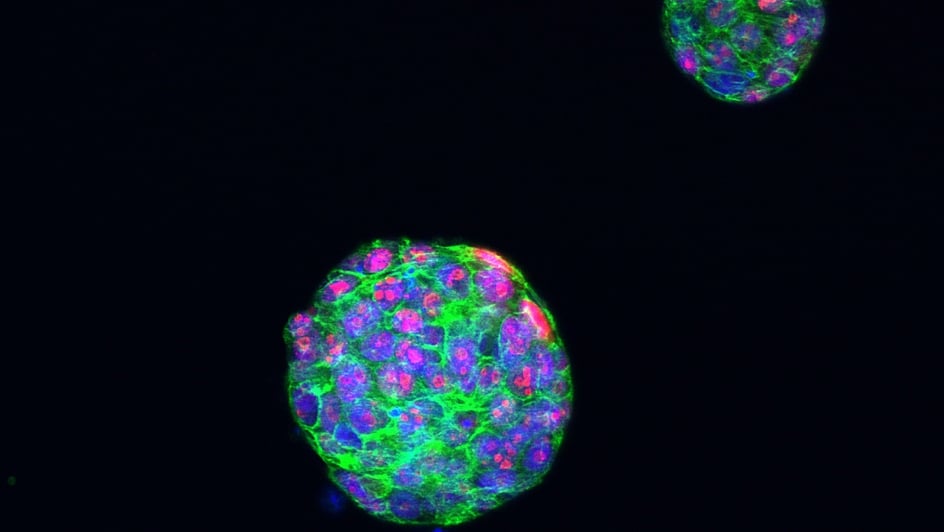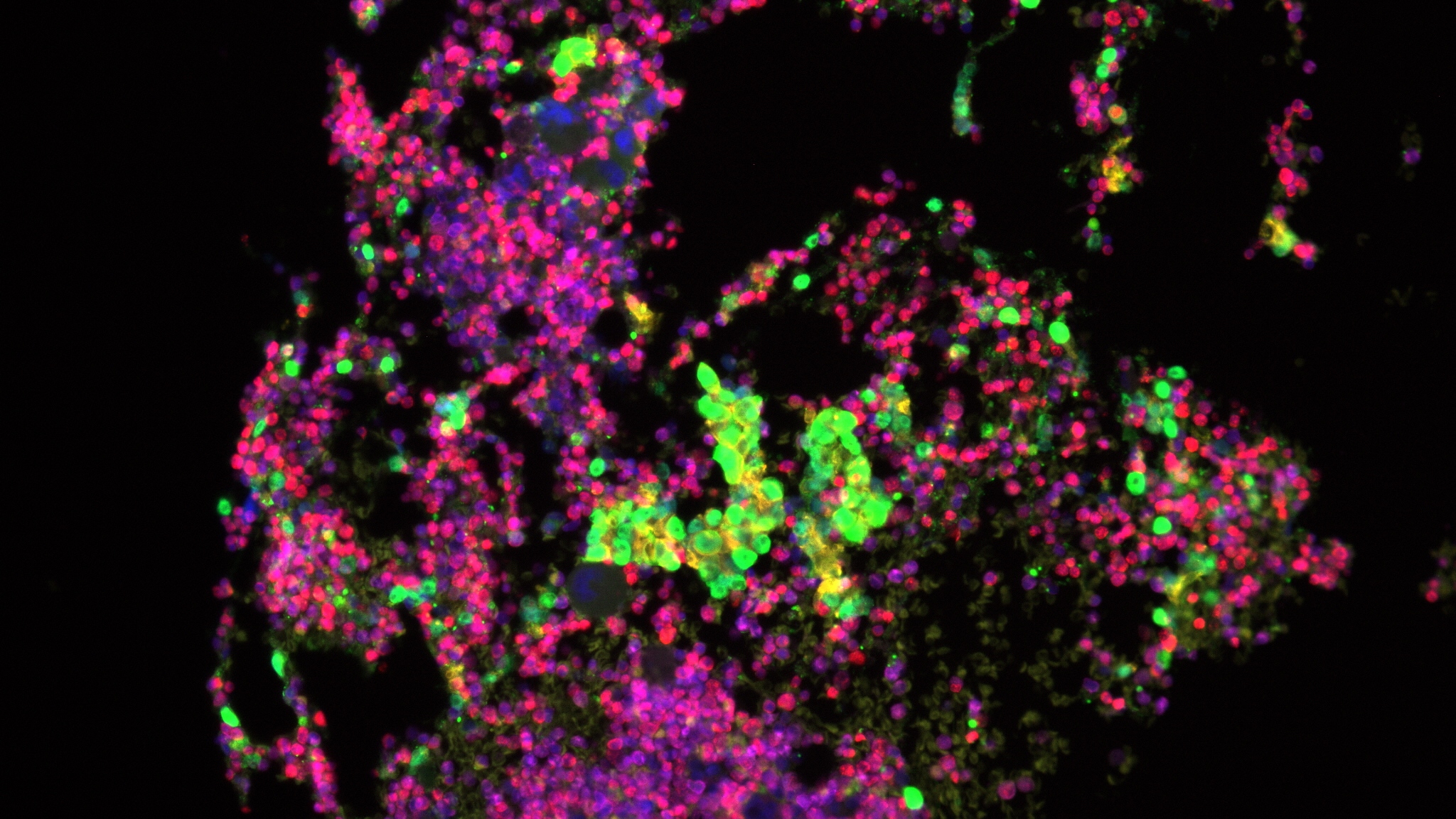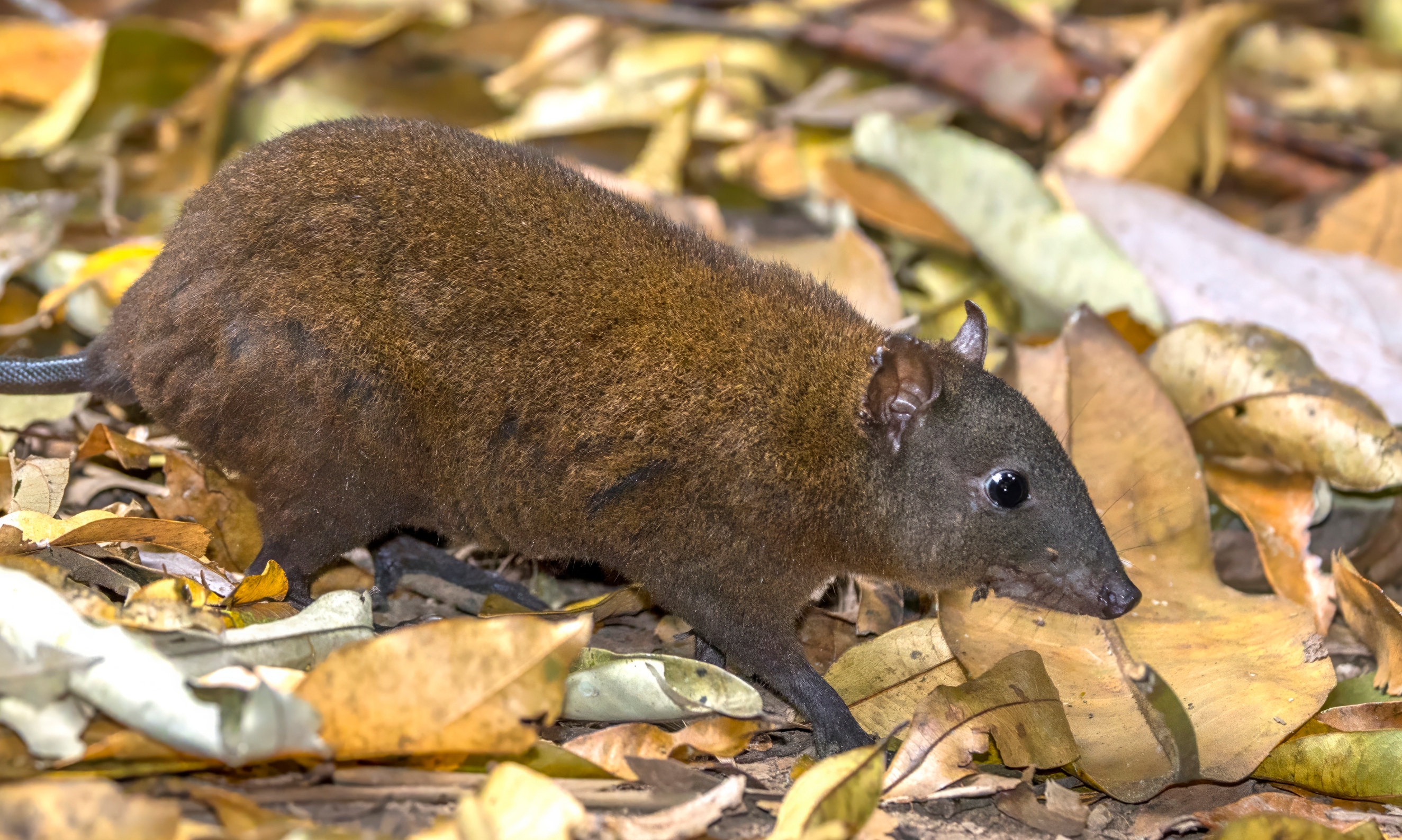Paediatric Solid Tumour Biology and Therapeutics Group
Professor Louis Chesler’s group is investigating the genetic causes for the childhood cancers, neuroblastoma, medulloblastoma and rhabdomyosarcoma.
Research, projects and publications in this group
Our group's aim is to improve the treatment and survival of children with neuroblastoma, medulloblastoma and rhabdomyosarcoma.
The goal of our laboratory is to improve the treatment and survival of children with neuroblastoma, medulloblastoma and rhabdomyosarcoma, three paediatric solid tumours in which high-risk patient cohorts can be defined by alterations in a single oncogene. We focus on the role of the MYCN oncogene, since aberrant expression of MYCNis very significantly associated with high-risk in all three diseases and implies that they may have a common cell-of-origin.
Elucidating the molecular signalling pathways that control expression of the MYCN oncoprotein and targeting these pathways with novel therapeutics is a major goal of the laboratory. We use a variety of innovative preclinical drug development platforms for this purpose.
Technologically, we focus on genetically engineered cancer models incorporating novel imaging (optical and fluorescent) modalities that can be used as markers to monitor disease progression and therapeutic response.
Our group has several key objectives:
- Mechanistically dissect the role of the MYCN oncogene, and other key oncogenic driver genes in poor-outcome paediatric solid tumours (neuroblastoma, medulloblastoma, rhabdomyosarcoma).
- Develop novel therapeutics targeting MYCN oncoproteins and other key oncogenic drivers
- Develop improved genetic cancer models dually useful for studies of oncogenesis and preclinical development of novel therapeutics.
- Use such models to develop and functionally validate optical imaging modalities useful as surrogate markers of tumour progression in paediatric cancer.
Professor Louis Chesler
Clinical Senior Lecturer/Group Leader:
Paediatric Solid Tumour Biology and Therapeutics.tmb-propic-md.jpg?Culture=en&sfvrsn=c25d2b2f_9)
Professor Louis Chesler is working to understand the biology of children’s cancers and use that information to discover and develop new personalised approaches to cancer treatment. His work focuses on improving the understanding of the role of the MYCN oncogene.
Researchers in this group
 .
.
I obtained an MSci in Biochemistry from the University of Glasgow in 2018. In October 2018 I joined the labs of Dr Michael Hubank and Professor Andrea Sottoriva to investigate the use of liquid biopsy to monitor clonal frequency and emergence of resistance mutations in paediatric cancers.
Professor Louis Chesler's group have written 113 publications
Most recent new publication 1/2025
See all their publicationsVacancies in this group
Working in this group
Postdoctoral Training Fellow - Endocrine Control Mechanisms
Under the guidance of Professor Cathrin Brisken, we are seeking a highly motivated and ambitious Postdoctoral Training Fellow to combine innovative patient-derived xenograft models and genetic tools to disentangle the role of estrogen and progesterone receptor signaling in breast cancer. The work contributes to gaining more insights into patient-specific hormone dependencies and factors determining them with the aim of personalizing breast cancer therapy and prevention. The successful candidate will be part of a transdisciplinary team of biologists, clinicians and computational scientists and part of close interactions with groups at the ICR, the RMH and King’s College as well Prof. Brisken’s research group at EPFL, Switzerland. About you The successful candidate must have a PhD in biochemistry, pharmacology, cell or molecular biology and demonstrable experience in planning and designing experiments. Ability to write efficient computer code would is desirable. Candidates who are nearing completion of their PhD may apply, but confirmation on awarded PhD is required within 6 months of employment. The ICR has a workforce agreement stating that Postdoctoral Training Fellows can only be employed for up to 7 years as a PTDF at the ICR ( this includes experience gained at PDTF level prior to joining the ICR). For general information on Postdocs at The ICR, more information can be found here. Research Group Information Under the leadership of Professor Cathrin Brisken, The Endocrine Control Mechanisms group are using intraductal mammary gland implantation, and ex vivo studies using breast cancers expanded via intraductal implantation. We also use transcriptomic and proteomic studies to investigate therapeutics for breast cancer patients and improve the development of novel treatment options for them. Directorate Information The Breast Cancer Now Toby Robins Research Centre, within the Division of Breast Cancer Research of the Institute of Cancer Research which is the first centre in the UK entirely devoted to breast cancer research. Our goal is to advance research into the causes, diagnosis and treatment of breast cancer. It is located in state-of-the-art laboratory space, with excellent core facilities and is funded through a long term renewable programme grant from Breast Cancer Now. The Centre is Directed by Clinician Scientist Professor Andrew Tutt, Professor Chris Lord is Deputy Director of the Centre. What we offer A dynamic and supportive research environment Access to state-of-the-art facilities and professional development opportunities Collaboration with leading researchers in the field Competitive salary and pension We encourage all applicants to access the job pack attached for more detailed information regarding this role.
Postdoctoral Training Fellow
Under the leadership of Claudio Alfieri, we are seeking to appoint a Postdoctoral Training Fellow to join the Molecular Mechanisms of Cell Cycle Regulation Group at the Chester Beatty Laboratories, Fulham Road in London. This project aims to investigate the molecular mechanisms of cell cycle regulation by macromolecular complexes involved in cell proliferation decisions, by combining genome engineering, proteomics and in situ structural biology. For general information on Post Doc's at The ICR can be found here. Key Requirements The successful candidate must have a PhD in cellular biochemistry and experience in Cryo-EM and CLEM is desirable. The ICR has a workforce agreement stating that Postdoctoral Training Fellows can only be employed for up to 7 years as PDTF at the ICR, providing total postdoctoral experience (including previous employment at this level elsewhere) does not exceed 7 years Department/Directorate Information: The candidate will work in the Molecular Mechanisms of Cell Cycle Regulation Group within the ICR Division of Structural Biology headed by Prof. Laurence Pearl and Prof. Sebastian Guettler. The division has state-of-the-art facilities for protein expression and biophysics/x-ray crystallography, in particular the Electron Microscopy Facility is equipped with a Glacios 200kV with Falcon 4i detector with Selectris energy filter and the ICR has access to Krios microscopes via eBIC and the LonCEM consortium. We encourage all applicants to access the job pack attached for more detailed information regarding this role. For an informal discussion regarding the role, please contact Claudio Alfieri via Email on [email protected]

Employee Story
Postdoctoral Training Fellow (scientific role) Dr Giulio Caravagna is a Postdoctoral Training Fellow at The Institute of Cancer Research, working in Professor Andrea Sottoriva's Evolutionary Genomics and Modelling team, and jointly supervised by Professor Louis Chesler, Professor of Paediatric Solid Tumour Therapeutics.
Industrial partnership opportunities with this group
Opportunity: A novel test for predicting future cancer risk in patients with inflammatory bowel disease
Commissioner: Professor Trevor Graham



